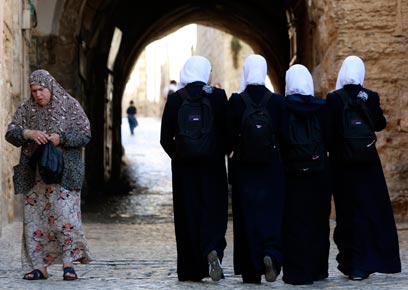That may be unfortunate, but we must look reality in the eye: The public has spoken, and the left-center parties which are in favor of dividing the land are no longer relevant. In fact, the old dream of a sovereign Jewish state in one corner of the world is no longer relevant either.
There is bitter irony in the fact that the right, which went out in droves to vote for Netanyahu for fear of the Arabs, brought the hope of Jewish independence to an end and laid the foundations for the development of a different entity.
Writer Amoz Oz expressed his concern recently that if we fail to reach a compromise with the Palestinians very soon, a different state will be established here some time from now, and it won't be a binational state but an Arab state. Oz is right, and there is room for concern. Minorities in the modern Middle East are not having an easy time, and there is a reasonable chance that we, the Jews, will become a persecuted minority too.

The next generations may pay the price of our mistakes, but that's the way of the world in which grandchildren and great grandchildren are punished for the sins of their grandparents.
But could the Arab state actually be a good place to live in? There is a chance that once the turbid wave of radical Muslim nationality is over, we will be able to experience again – under Arab rule – a golden age like Muslim Andalusia in the Middle Ages or the Ottoman Empire under Suleiman the Magnificent.
More than the Arab state which might be established 50 years from now, we should be concerned by the transit period – the period of our lives. Because the Jewish public in Israel will not give up so easily on the remains of its rule, oppression will increase. At some point, our fig leaf – the lame duck called the "Palestinian Authority" – will fall off too, and Israel will be one state from the Mediterranean Sea to the Jordan River, with millions of residents with no civil rights.
Until we become an Arab state, these residents will suffer from a lack of basic rights: They won't be able to elect and be elected to the Knesset; they won't have any representation in the government and in the judiciary; the state's basic laws won't protect them from economic exploitation; and they won't be allowed to live in certain parts of the state. The anti-Israel boycott organizations will flourish, champions of human rights will continue publishing serious reports about the Israeli government's brutal conduct, and we will occasionally be hit with a condemnation at the United Nations or with sanctions.
But the world won't save us from the expected fate. The United States, whose strategic interest requires supporting regimes like the Chinese dictatorship and misogynous Saudi Arabia, will sustain a proper relationship with us. We will be able to continue oppressing the Palestinians quietly, until we sober up and are forced to grant them full civil rights.
In the long run, we should hope that things work out and that everyone – both Arabs and Jews – becomes citizens in the state. But in this generation, our mission is clear: Not to fight the war of the lost two-state dream, but to prevent oppression, protect the Palestinians from the cruelty of such an apartheid method and fight for individual rights and civil rights for all residents of the state between the river and the sea.
At the same time, we must prepare both Jews and Arabs to honor the minority's rights. We must remember: Today it's them, tomorrow it’s us.

















